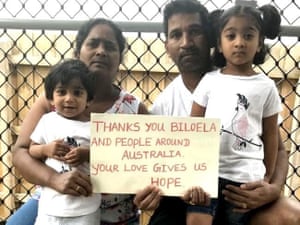Fifty-two refugees and asylum seekers in offshore detention have
received temporary protection visas or safe haven enterprise visas
Some 52 refugees and asylum seekers in offshore detention have
received temporary protection visas or safe haven enterprise visas,
according to new statistics that fly in the face of the Morrison government’s refusal to allow the Biloela Tamil family to stay.
The home affairs department has revealed to a Senate inquiry that of the 3,127 people classified as “illegal maritime arrivals” who have been taken to a regional processing country since 2011, some 52 have received visas and now face legal limbo if banned from permanent settlement in Australia.
Fourteen families are set to be broken up by a government bill to prevent asylum seekers who were sent to regional processing coming to Australia, it said. The statistics also reveal that of a total of 5,191 asylum seekers who came to Australia by boat 2,074 people were never transferred to a regional processing country.

The home affairs department has revealed to a Senate inquiry that of the 3,127 people classified as “illegal maritime arrivals” who have been taken to a regional processing country since 2011, some 52 have received visas and now face legal limbo if banned from permanent settlement in Australia.
Fourteen families are set to be broken up by a government bill to prevent asylum seekers who were sent to regional processing coming to Australia, it said. The statistics also reveal that of a total of 5,191 asylum seekers who came to Australia by boat 2,074 people were never transferred to a regional processing country.

It is not clear how many of the asylum seekers arrived before or after the 19 July 2013 deadline, when the Rudd government decided that all asylum seekers who arrived by boat would be transferred to offshore detention and not be settled in Australia.
But Labor senator Kim Carr, the deputy chair of the committee, said the statistics “give the lie to the argument that nobody will be settled here”.
On Friday, Labor’s shadow home affairs minister, Kristina Keneally, said the government “doesn’t hesitate to use its discretion … when it suits them”, citing the example of a Rohingyan refugee let in by home affairs minister, Peter Dutton, first revealed by Guardian Australia, which she said “didn’t restart the boats”.
Keneally said it was “cruel” to suggest the Biloela Tamil family could apply for a work visa and have the wait times waived without giving a guarantee.
Greens immigration spokesman Nick McKim said the revelations “undermine the Liberals’ entire argument in support of offshore detention” showing the “arbitrary nature” of government decision-making about who had been sent to Nauru and Manus Island and who was allowed to stay in Australia.
“The government’s rhetoric has never relied on fact,” he said. “Operation Sovereign Borders is merely a political construct but this has blown their arguments out of the water … including the argument that it is necessary to deport the family from Biloela.”
On Wednesday, Scott Morrison said the government had not – to his knowledge – intervened to allow people he called “illegal immigrants” to stay in Australia in the more than 4,000 documented uses of ministerial discretion to grant visas despite reported cases of people allowed to stay.
In recent weeks refugee advocates, Labor, the Greens, Alan Jones and Barnaby Joyce have urged the government to reverse plans to deport Tamil family Priya, Nadesalingam and their two Australian-born children Kopika, 4, and Tharunicaa, 2, who were sent to Christmas Island almost a week ago. On Friday the federal court extended its injunction preventing the government deporting Tharunicaa to 18 September.
The home affairs department also revealed that “14 families including babies born to stateless parents in Australia who have attained Australian citizenship and babies born to a permanent resident or citizen parent in Australia would be separated” by the provisions of the bill.
McKim said: “The confirmation that tearing families apart is official government policy is heart rending and unconscionable.”
“This tears at the very fabric of how we see ourselves as a country. [The prospect of] children being torn from their mothers or fathers arms is simply heart-rending.
“This information alone should be enough for the Senate to reject the bill.”
Pip De Veau, the general counsel at home affairs, has said that nothing in the bill would invalidate temporary protection visas but conceded that at the expiration of those visas Dutton would need to exercise a further discretion to extend their stay, which McKim said put them at risk of immigration detention or deportation.
Carr said the 52 people granted TPVs or safe haven enterprise visas would be “left in legal limbo” and may be prevented from ever applying for another visa type “irrespective of their individual circumstances”.
In July Guardian Australia revealed that in 2015 Dutton approved a plan to bring a refugee child to Australia after lobbying from Nauru, despite warnings from his department that it would be seen as a contradiction of the policy not to resettle people in Australia who came by boat.
Dutton made the intervention on behalf of a stateless Rohingyan unaccompanied minor whose parents were murdered in front of him in Myanmar before he arrived at Christmas Island by boat in October 2013.

No comments:
Post a Comment